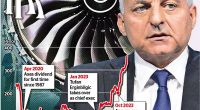
Life sciences is among the UK’s leading-edge sectors with a reputation for excellence.
In recent weeks the bosses of Britain’s two pharmaceutical giants, Pascal Soriot at AstraZeneca and Emma Walmsley at GSK, have reaffirmed their belief in the UK.
Chancellor Jeremy Hunt also recognises its importance and last year allocated £650million to back research.
So it is against the grain that London-quoted drugs innovator Indivior, with a market value of £2billion, wants to move to the US, joining firms seeking to quit London in search of a higher valuation.
Admittedly, Indivior’s main operations are in North Chesterfield, Virginia. Both Astra and GSK have large US operations but feel no need to shift. Quite the contrary.

Quitting City: London-quoted drugs innovator Indivior, with a market value of £2bn, wants to move to the US, joining firms seeking to quit London in search of a higher valuation
When American rival Pfizer sought to buy Astra in 2014 it was thwarted, and Astra is now worth more than its former predator.
Glaxo had the chance to transfer to the US when it merged with SmithKline but chose a London quote instead.
Evidence suggests that firms which make the journey rarely enhance their value (Arm Holdings is the big exception so far) and become tadpoles in a big pool.
One might have hoped Indivior’s British chairman, Graham Hetherington, a former finance director of two FTSE 100 companies, and senior non-executive Juliet Thompson might have shown some public resistance.
The NHS, after all, is a test bed for new compounds and the regulator the MHRA is developing a reputation for fast-tracking new medicines.
Indivior specialises in developing drugs to deal with addictions and mental health – both key areas of public policy in the UK.
Here is the rub: to make the move the company will need the support of 75 per cent of its shareholders.
The difficulty is that Britain can no longer count on long-only investors to stand up for London-listed companies.
The Invidior share register is dominated by American funds with New York’s Two Seas Capital, with 10.21 per cent, the biggest holder.
The first UK shareholder on the register is Barclays Capital with 1.32 per cent in 15th place, with Liontrust with 1.1 per cent in 20th spot.
There is no sign of a UK pension fund or a big insurer such as Aviva, to be seen.
The great betrayers of investment on the London market are long funds with little tolerance for risk taking and little truck with the national interest. It is a shocking indictment of UK asset management culture.
Japan reborn
In 1999 I was dispatched to Tokyo by my then employer The Guardian to write about Japan’s lost decade.
The stock market had collapsed from the dizzy heights of 1986 and property prices in central Tokyo were devastated, leaving owners in negative equity.
Even more stunning, a miracle economy which had enjoyed a lengthy period of full employment was in a nosedive. A neat tent city of the homeless had sprung up on parkland close to the Imperial Palace.
Restoring the Tokyo stock market to the peak levels has taken 34 years.
Japan has been through a journey of fiscal expansion and monetary largesse. Its reputation for electronics and innovation has been swamped by the rise of China.
Throughout all this, pioneering engineering of hydrogen cars, carbon fibre for aircraft and production of equipment for semi-conductor manufacturers continued apace.
Among the Western investors to recognise the renaissance was the Oracle of Omaha, Warren Buffett.
He ploughed into Japan in 2020, buying substantial stakes in five trading houses.
Buffett lifted his holdings to 8.5 per cent last year. His judgment has been vindicated with the Nikkei index closing at a record 39,098.68 yesterday.
It’s time to encourage Buffett to focus on another undervalued market: the FTSE 350.
Lloyds canary
The main excitement in Lloyds Banking Group 2023 results ought to have been the 57 per cent jump in pre-tax profits.
But since much of this is down to interest rate margins – the gap between what it charges borrowers and what it collects from savers and cash deposits – it hardly represents a triumph of financial genius.
More fascinating is the £450million charge for potential redress of poorly sold car loans. The scandal is described by consumer analysts as the biggest compensation liability since payment protection insurance (PPI).
Yikes!
This post first appeared on Dailymail.co.uk






